Search
Did you mean: Tophet?
Summary 
Loading AI-generated summary based on World History Encyclopedia articles ...
Search Results
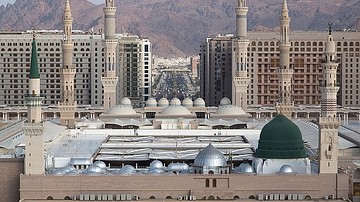
Definition
Prophet Muhammad
Muhammad ibn Abdullah (l. 570-632 CE) is venerated today as the Prophet of Islam and the “seal of Prophets” by his followers – the Muslims. Muslims believe that Muhammad was the last – hence the “seal” – of many prophets before him in Judaism...
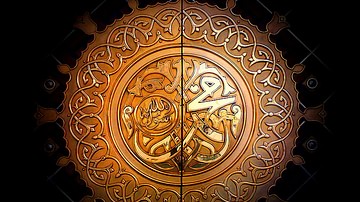
Definition
Islam
Islam is an Abrahamic-monotheistic religion based upon the teachings of Prophet Muhammad ibn Abdullah (l. 570-632 CE, after whose name Muslims traditionally add “peace be upon him” or, in writing, PBUH). Alongside Christianity and Judaism...

Definition
Abu Bakr
Abu Bakr (l. 573-634 CE, r. 632-634 CE) was an early convert of Islam; he was a close friend and confidant of the Islamic Prophet Muhammad, and became the first caliph of the Islamic empire – a successor to Muhammad's temporal position but...

Definition
Fatimah bint Muhammad
Fatimah (born between 605 and 615 CE, died sometime in 632 CE; date of death is disputed) was the youngest daughter of the Islamic Prophet Muhammad (l. 570-632 CE) and his first wife Khadija (l. 555-619 CE). Taking up after her father, Fatimah...

Image
Gates of the Prophet's Mosque, Medina
Photo of the inscription on the gates of the Mosque of the Prophet (Arabic: Al-Masjid an-Nabawī) in Medina, Saudi Arabia. The inscription has the name of Prophet Muhammad, followed by his title "the apostle of God". A black vignette has...
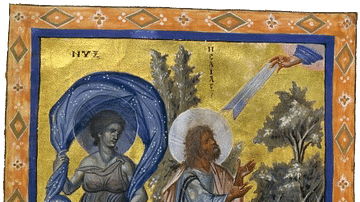
Image
Nyx and the Prophet Isaiah
Manuscript illumination depicting Nyx and the Prophet Isaiah from the Paris Psalter (Parisianus graecus 139, folio 435 verso), c. 940-960. National Library of France, Paris. The prophet Isaiah is flanked by Nyx (Night) and the Dawn. The...

Image
Vision of the Prophet Ezekiel
Vision of the Prophet Ezekiel, fresco by Feodor Bruni.
St Isaak Cathedral, Saint Petersburg.
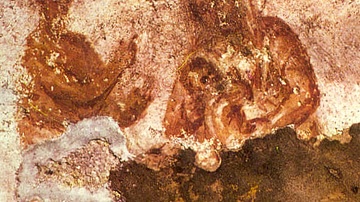
Image
Virgin and Child with Balaam the Prophet
Perhaps the oldest known image of Maryand is dated c. 230 to 240 CE. It depicts Mary nursing the Infant Jesus, while the figure at the left appears to be the prophet Balaam pointing to a star (outside the frame). This fresco is in the Catacombs...
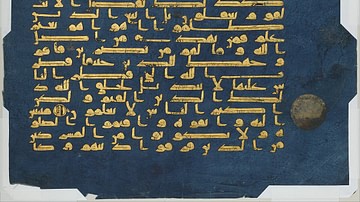
Definition
Quran
The Quran (also written Qur’an or Koran), revealed in the 7th century, is the sacred book of Islam, following in the tradition of the Abrahamic faiths, with the Torah as the sacred book of Judaism and the New Testament as the sacred book...

Definition
Ali ibn Abi Talib
Ali ibn Abi Talib, or simply Ali, (l. 601-661 CE) was among the first Muslims, a cousin and son-in-law of the Islamic Prophet Muhammad (l. 570-632 CE), and later reigned as the fourth Caliph of Islam from 656 CE to 661 CE, when he was murdered...